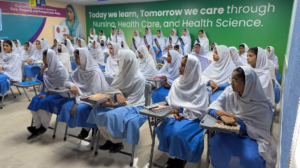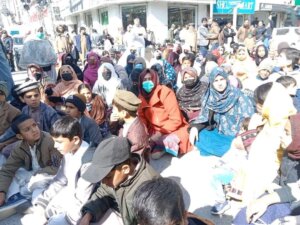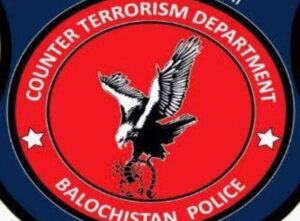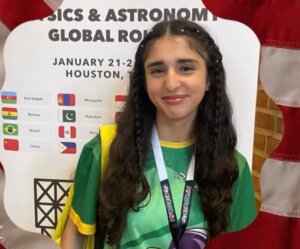By Shakoor Khan:
International Rescue Committee (IRC) under its Teach & Educate Adolescent Girls with Community Help (TEACH) project, reached out to 29,000 out-of-school girls of 5 districts of Balochistan including Pishin, Killa Abdullah, Nushki, Kharan and Chagai.
“IRC is striving hard to promote girl’s education in Balochistan besides imparting vocational trainings on financial literacy and trades to make them financially independent,” said Shareef Mengal, Head of IRC Balochistan during a policy dialogue titled “Improving future of girl’s education in Balochistan held in collaboration with UK aid at local hotel here.
Balochistan Education minister Naseebullah Mari was the chief guest while representatives from the Education ministry, Directorate of Special Education, Literacy, Non-Formal Education & Human Rights Department, Balochistan Assessment and Examination Commission, Balochistan Textbook Board , Policy Planning Implementation Unit , Provincial Institute of Teachers Education, Education Support Programme, Global Partnership of Education, German Agency for International Cooperation, United Nations International Children’s Emergency Fund Society for Community Strengthening and Promotion of Education, Balochistan, Institute for Development Studies and Practices, Japan International Cooperation Agency also attended the event.
The event hosted conversations with multiple stakeholders including education experts and government functionaries on the barriers faced by girls in the province in pursuing their education and discussed possible solutions to combat those barriers.
salient feature of the project IRC
While highlighting the salient feature of the project IRC chief in Balochistan Shareef Mengal said under the ‘Girls Learn’ stream of the project, 22,000 girls received classes on Package A, B and C of non-formal curriculum, of them 4000 enrolled in mainstream formal schooling system.
Under’ Girls Earn’ stream of the project, 7000 girls completed Package A of the non-formal curriculum, out of these 7000 girls, 5000 received training on financial literacy and business development planning. 2400 girls received training on 8 vocational trades and toolkits and 250 girls received financial grants to start a business.
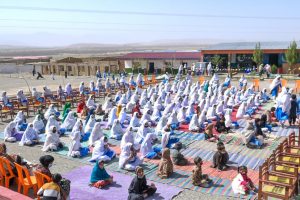
Also Read: Blast damages a girls school in Kohlu Balochistan
Naseebullah Marri, Education Minister Balochistan, on the occasion urged that ‘We must do our part to remove the barriers faced by girls in the region so that every girl can pursue her education and become a valuable member of society”
‘The Government is making all out efforts to combat the low literacy rate which has affected girls from all ethnic groups, and socioeconomic backgrounds,”
We are committed to assist and contribute to building economically prosperous, and educated Balochistan, so every child has access to education.
He however welcomed the support extended by the International Rescue Committee for providing educational and vocational training opportunities, saying he is very grateful for the on-ground initiative of community-based schools in Balochistan.”
Abdul Rauf Baloch – Secretary Secondary Education on the occasion appreciated the contributions of IRC for girls’ education in Balochistan.
He shared that education is a complex subject which cannot be discussed without WASH, health and other facilities. This makes it a responsibility of all relevant departments and stakeholders who should play their role effectively.
Zain Ul Abedin Khan, Deputy Director Programs, IRC, in his remarks said that “We as a society need to commit to prioritize and focus on Girls’ Education through adequate resources. Girls’ education in Balochistan is one of the biggest challenges faced by the country and to deal with it we must work with innovative methods like Non-Formal Education.
” He further added that, “Over the years, we have realized that if girls are unable to reach school, all stakeholders need to fill the gap and provide access to lifelong learning opportunities like productive skills and life-skills within communities.
Girl’s education is correlated with lower rates of poverty
The panel discussions established an opportunity for the policy makers and practitioners to understand that girl’s education is correlated with lower rates of poverty and improved health outcomes. While stimulating dialogue, the stakeholders pledged to work together to eradicate the barriers to girls’ education by providing gender inclusive facilities and quality of education.
The event was a culmination of three sessions where the first was hosted to discuss the barriers faced by girls in pursuing their education. The panelists of the first session classified the barriers into 3 categories: Cultural, Economic and Service Delivery. The panelists recommended Accelerated Learning Programs (ALPs) as a viable option while integrated with skill-based trainings and digitalizing education.
Also Read: Quality of education poor despite 70,000 teachers in Balochistan
Initiatives to combat the barriers to education
The second session was focused on sustainable initiatives to combat the barriers with the help of Non-Formal Education in bridging the gap between primary and secondary schooling.
Chairperson of the session, Mr. Abdul Khaliq – Chief Planning Officer Policy, Planning, and Implementation Unit welcomed the participants and emphasized the importance of solutions to these barriers. Mr. Ashraf Gichki – Director Literacy and Non-Formal Education shared contribution of NFE department toward provision of second chance of education to out-of-school children.
Personal struggles in overcoming the barriers to education
The third and final session gave the TEACH clients an opportunity to express their personalized struggles in overcoming the barriers to education.
Anam – client of TEACH project from Pishin shared that after joining TEACH ALP center, she can read books and newspapers. Simra from the same district shared that her parents don’t allow travelling long distances to attend school but after opening of ALP center at doorsteps, she was able to join the classroom for first time in her life. Haleema from Nushki district shared that her mother is the only breadwinner of home and works at households of others to earn income. Haleema shared that she is the only child of her family who can read, thanks to joining ALP center.

